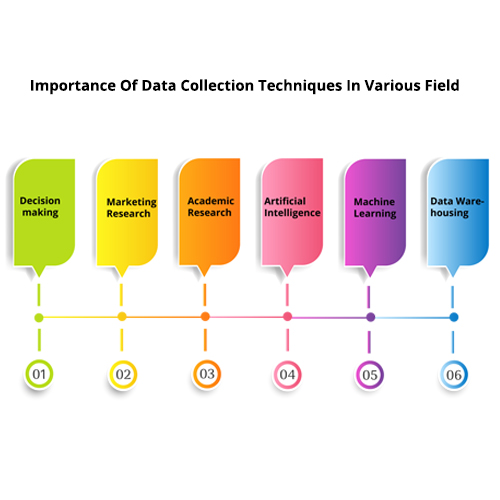What are the importance’s of data collection in different areas? Mention some tools used in data collection.
In Brief:
- The amount of information you have about your customers like their interest wants and needs revels that you have a better understanding, which will help you to create a product that meets and exceed your customer expectation.
- Supports machine learning which enables the computer to think and act like humans, and also help to improve their learning ability, to work automatically without human intervention.
- Artificial intelligencesystem performs analytical activities associated with human intelligence such as planning, learning, reasoning and problem-solving.
Introduction
Data collection plays a significant asset in any research study. Research work carried can vary from field to field but all the research work based on data which is analyzed and interrupted to get information.Data is one of the vitalresourcesintoday’s business.The amount of information you have about your customers like their interest wants and needs revels that you have a better understanding, which will help you to create product meet and exceed your customer expectation. Data is defined asa quantitative or qualitative value of a variable.A datum is a plural form of data means to give, or something is provided, which can be a number (numerical data), image, words, figure, facts or ideas. It is the basic unit of information based on which other analysis and measurement can be done. It is impossible to understand data to derive anyknowledge from data; one must break it into meaningful information. There were many methods found for interpreting data.The data source can be broadly classified into Primary and secondary data. Data is the fundamental unit in statistical studies, which help in creating statistical information from data’s like census, population variables, health statistics, and road accident records.
Techniques involved in data collection
Data collection techniques can be broadly classified into primary data and secondary data.
Primary Data
Primary data is the original data which is gathered by the researcher at first andis used for the study. Its main aim is toaddress the problem. It uses survey, experiment or direct observation techniques to gather data.It is the data directly deduced from the source by someone as first hand.Data collected in this way is called primary data which is more reliable, authentic and objective. It cannot be altered or transformed by human beings, and therefore, its validity is higher when compared with secondary data. Disadvantages of using primary research are its high in cost,time-consuming process, more numbers of resources are required,and feedback change from person to person while surveying.
Secondary Data
Secondary data were collected from already gathered sources. They can be accessed freely, which are more quickly available than primary data. They are cheaper in cost and availability. Secondary data collection technique which is also known as “data mining”.Secondary data collection accompanied by collecting information from a diverse source of information or electronically stored information, census, and marketing studies is some examples of secondary data. Data mining service provide secondary data which help in identifying difficulties in research work and offers alternative methods to overcome.The main reason for using secondary data is they are reasonable, easily accessible, and readily available. It alerts the researcher about programming difficulties, and it offers research method alternatives. But they are costly and not immediately available while solving a problem.
Data Collection Methods
Data collection methods are broadly classified into two type’s quantitative and qualitative research.
- Qualitative research:
It is the process of collecting and analyzing numerical data. It is mainly used to findpatterns and averages, make predictions, to findcausal test relationships and it is primarily used in biological researchand social science: biology,chemistry, psychology,economics,marketing etc. The two main methods used to collect Quantitative data are
- Direct collection method:Without knowing the purpose data are directly collected using disguised methods like focus point, depth interview and case study.
- Indirect collection method:This uses the projective technique for data collection.
- Quantitative Research:
- It helps in quantifying data and generalizing result, which is taken as the sample from the population, in this type.
- Data can be collected by survey method and observation.
- Survey Data Collection Services provides sufficient data to quantify and to generalize the result.

Importance of data collection in different areas
Some of the essential tools and techniques which use the data mining concept to achieve the best result are
Data cleansing and preparation
It transforms data into an appropriate form which helps in analyzing and processing of data to identify missing data and to remove the error.
Clustering
Clustering is partitioning the dataset into meaningful sub-classes called clusters, which help the user in understanding the natural grouping or structure in the records.
Artificial intelligence (AI)
This system performs analytical activities associated with human intelligence such as planning, learning, reasoning and problem-solving.
Data warehousing
It is an extensive collection of business data used by an organization to make decisions. It is the foundational component of theessential data-mining efforts.
Machine learning
Machine learning is the science which enables the computer to think and act like humans, and help to improve their learning ability, to work automatically without human intervention. It helps to achieveautonomous by feeding them data and information in the form of observation and real-world interaction.
How data collection help in writing a dissertation
Data collection plays a significant role in the research project.Numerous research methods exist so you should carefully identify the process that is most suitable for your topic and the research area. Most of the research work includesrealistic work. You should be able to determine how you will be able to gather any relevant data. For example, you can mention how you can access particular information sources (from database). Your research approaches may contain the collection of data, which can be interpreted to address your problem statement orhelp in increasing knowledge related to your research area. Ensure that the collected data must be sufficient to produce the expected result,Whether you can able to achieve the work with the data and Data Analysis.
Importance of Data Collection in Market Research
Data collection plays a significant role in market research. Much important marketing decision are taken based on collected data; Market Research Data Collection Services provide these types of data for the research project.The main element of data collection is, it confirms the quality of the data collected.The collected data must be high quality, i.e. accurate,valid and reliable and relevant to the research area.In some cases,the researcher tries to get the same data from numerous data sources to ensure the reliability and validity of previously collected data.The quality of the data, it is necessary to identify its reliability, whetherit is repeating the same methods produces and obtaining the same results. Validity is the measure of what issupposed to measure.Market Research and Consumer Data Collection Services help in identifying customer need based on the data gathered. Outsource data collection service help you with data collection work at an affordable price.
Conclusion
The success of any research work is directly based on the quality and quantity of data gathered. Always ensure that you have collected sufficient data which is more than enough to produce the expected result.
References
- Shanks, G., &Bekmamedova, N. (2018). Case study research in information systems.
- Sutton, J., & Austin, Z. (2015). Qualitative research: Data collection, analysis, and management. The Canadian journal of hospital pharmacy, 68(3), 226.
- Gill, P., Stewart, K., Treasure, E., & Chadwick, B. (2008). Methods of data collection in qualitative research: interviews and focus groups. British dental journal, 204(6), 291-295.

 Next Post
Next Post